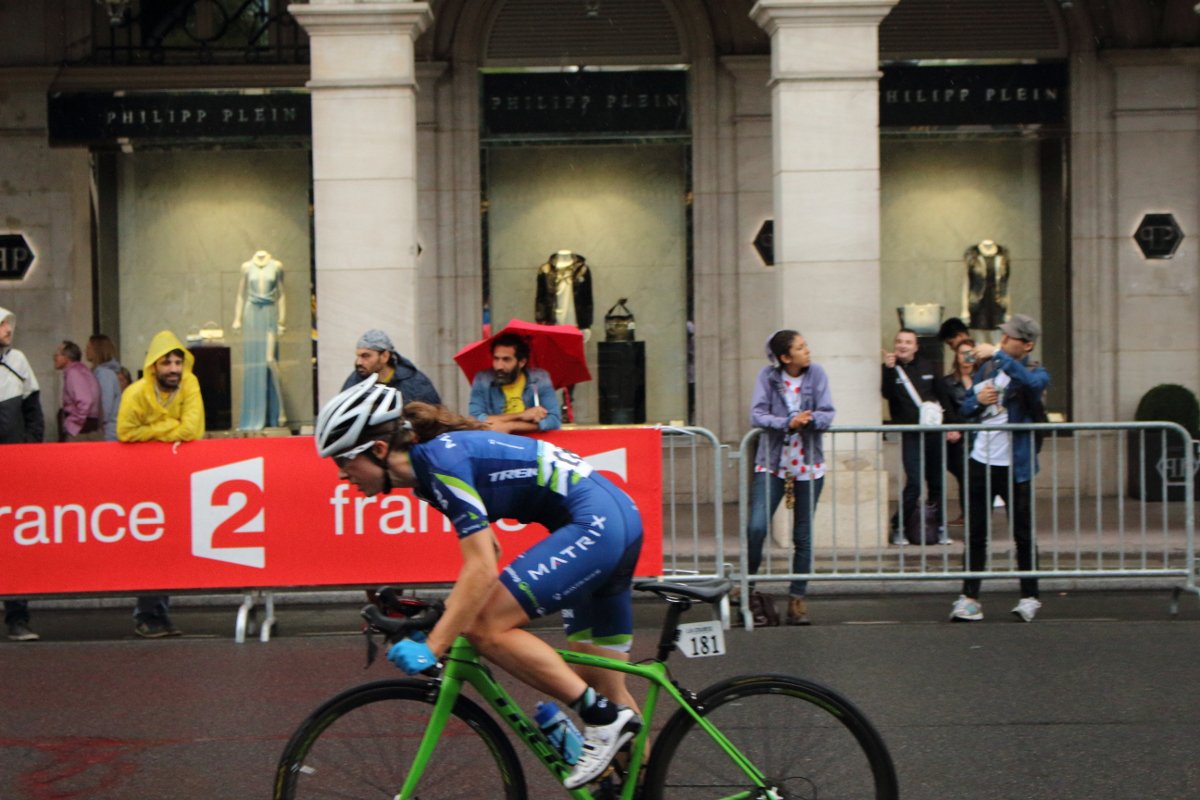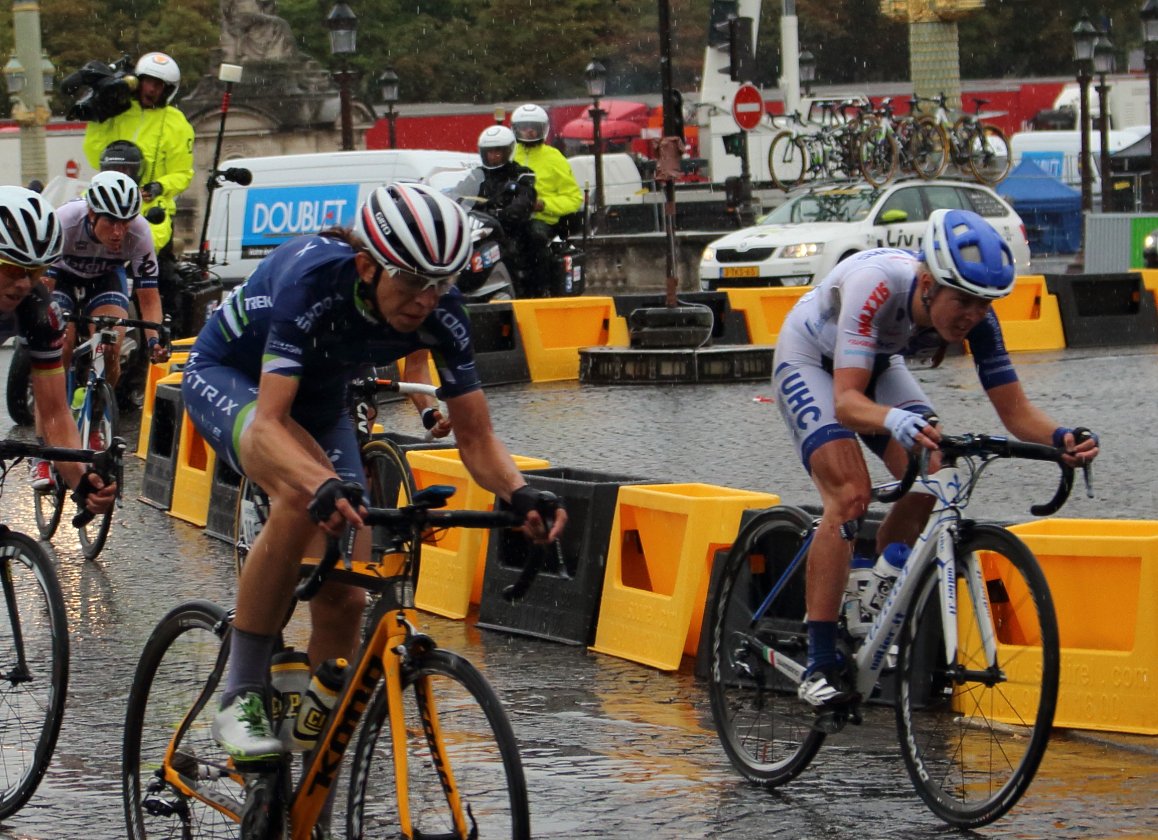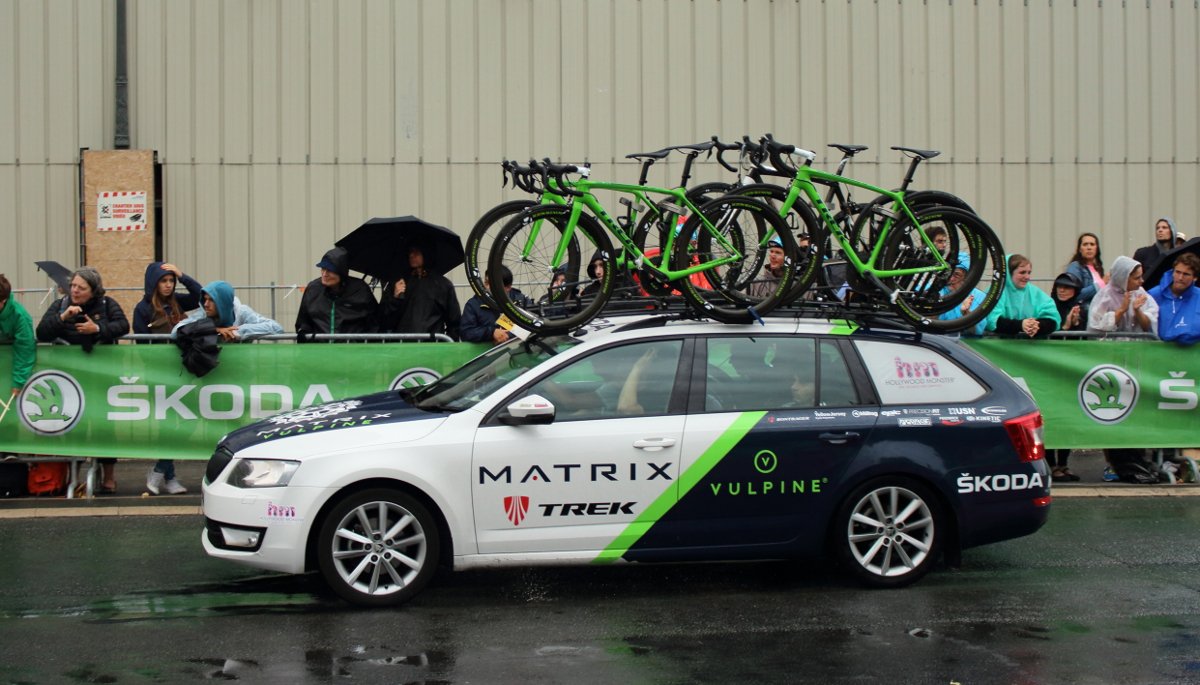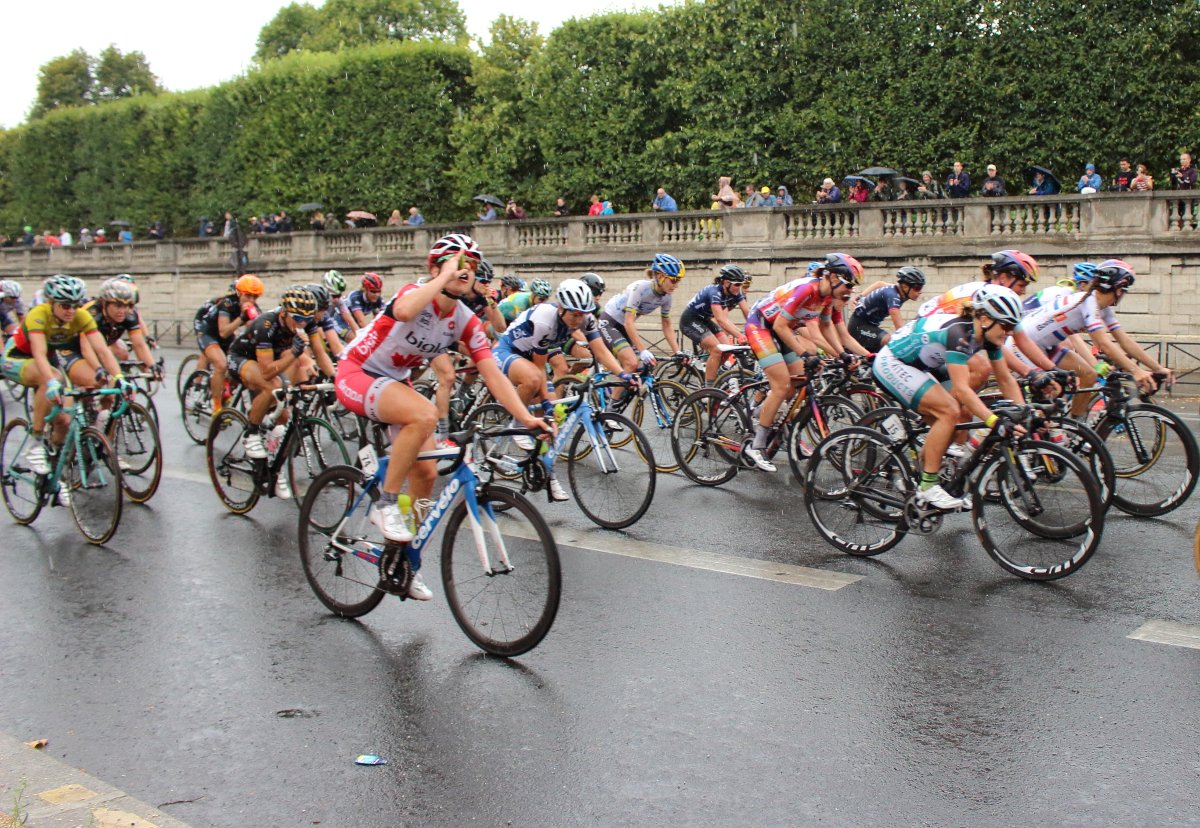Yellow Jersey were lucky enough to be in Paris over the weekend to watch the second edition of La Course by le Tour de France.

We have been involved with Matrix Pro Fitness as a sponsor for a little under a year, and so took the opportunity to speak with team Manager Stefan Wyman post race at La Course about the event; what it means for Matrix and Women’s cycling as a profession, and his thoughts on some of the criticism of La Course in the media running up to Sunday.
“It was obviously a really exciting event for everybody. It was the first time the team had gone there, and it was only the second edition of [La Course]. I imagine the nerves were pretty high, and we tried to distract that as much as possible, and treat it just like any other race.”
“Everyone around the team, everyone in the team has grown up watching that race. For the riders, even if they haven’t been into cycling their whole life, someone in their family has been a cyclist, so it’s definitely the day most people turn on for the Tour. So for everyone who sees it, their expectations are high. And it’s literally the best riders in the world, it just can’t really be replicated anywhere else.”
The heavens opened during the first lap, sending spectators scurrying for umbrellas and raincoats, and riders skidding into a succession of crashes. Clear at the front, eventual winner Anna Van Der Breggen of team Rabo-Liv was able to break away during the final lap, flying over the finish on the Champs Elysees to huge encouragement from the crowd, and the unforgettable enthusiasm of former team mate, and last year’s winner, Mariane Vos.
“I watched the rerun of it today; Rabo Liv had quite a hard race. During the race there were three or four of them constantly coming back through the cars from crashes. They had a really tough race, but Anna was constantly up there and never had a problem. She stayed away from all of the issues, and followed her team instruction perfectly to attack on the last break. It just shows how good that team is really.”
Matrix Pro Fitness have had an extremely busy race calendar this year, but the concern of limited coverage of a lot of the races remains. As such a high profile event, run alongside the most famous bike race in the world, I asked Stefan what Matrix’s place in the competition could mean for the team moving forward into next year.
“There’s a huge amount of exposure there. It’s live on TV in over 150 countries, hundreds of thousands of people on the sides of the road, social media goes absolutely crazy for it. We’ve had as good a race calendar as any team in the world. We’ve had a fantastic Spring Classics campaign with Gent-Wevelgem,Flèche Wallonne, The Tour of Flanders; all absolutely huge events for men and women. And then we’ve gone to the Aviva Women’s tour which is another huge event with lots of TV coverage, La Course, and then we’ve got [Prudential] Ride London this weekend which is live on the TV as well.”
“What that will mean in terms of bringing sponsors and interest to the team I don’t really know, that’s very much out of my hands. We are working really hard to increase the sponsorship base of the team, but it’s proving harder than ever to be perfectly honest. It’s really strange because we are coming into Olympic year.”
“We have a double Olympic champion on the team, we’ve had as good a race calendar as anybody, but even just engaging interest with sponsors is harder than ever. This is the eleventh year I’ve been doing this, and I’ve never found it harder; the market is tough.”
“We’ve got La Course Welter in September which is another big event, Ride London is a live event, Tour de Yorkshire have said there’s going to be a pro women’s event next year… Everything’s there for the sport to go forward, but it needs people in boardrooms and marketing departments to take a risk on the sport, and to be part of the move forward from the beginning.”
“Personally, I don’t see that Happening. We’ve even approached sponsorship agencies this year who have said they are just not interested in finding sponsors for women’s cycling. It is a really, really tough environment, it’s very, very hard.”

The Tour de Yorkshire recently announced they were to significantly increase their prize purse for the woman’s event next year. Prize money is often shown as an indicator of the disparity between men’s and women’s professional cycling. I was interested to see what Stefan thought of this, and how prize money really figures into women’s cycling.
“To make Women’s racing go forward, it’s not going to rely on there being big prize money. It’s fantastic that there’s big prize money. The best ten pick up that big purse, and that’s absolutely fantastic, but what you’ve got to remember is that the majority of riders winning money in professional races are already getting paid to be a professional bike rider, so winning prize money is just a bit of a bonus. What the sport really requires is for there to be more corporate sponsorship coming into the teams, so that more riders get paid, and the base number of riders who get the opportunity to ride full time, and to invest in themselves to become better riders, goes up.”
“As teams get more money, they can invest more in training camps, sports psychology and coaching; in winter training camps and opportunities that maybe they’re not giving out at the moment. I’m pretty sure that the riders on most professional teams would rather see there be a minimum salary of 10000 Euros for every rider, certainly for the world tour team in a couple of years, rather than more prize money.”
“To put it into numbers, I’d say La Course cost our team about 4000 Euros to do, and we didn’t win any prize money. If we did win prize money, the prize money goes to the riders, not the team. Irrespective of how we do, the team has to pay 4000 Euros, and we did it in a fairly cheap way. It cost us 4000 Euros to go to a one day race, times that by how many races you do in a season, that’s how much it’s costing us to go to events, and that’s what the corporate sponsorship covers. Prize money doesn’t cover that.”

La Course pride themselves on paying the same prize money for both the men’s and women’s events in Paris, as far as I am aware, this is the only Elite level competition where that is the case. While clearly a step forward and something we would like to see replicated elsewhere, from what Stefan was saying, it seemed as though this was something of a red herring, not the solution to the bigger problem of lack of sponsorship.
“At this point in time, I haven’t got a list of new sponsors for next year, but we have been to every single major race apart from the Giro [Rosa]. We would love to go to the Giro, but we just haven’t got the sponsorship dollars to pay to have enough riders on the team to have the strength and depth to ensure we have 8 riders fit and ready and strong in July. I think if we had gone there, we would have struggled to put a team out in to La Course at the weekend. It’s a balancing act as to how you do things.”
“The opportunity is defiantly there, the sport is defiantly getting bigger. The UCI are putting more resources behind women’s cycling across all the disciplines, and they’re putting lots of thought into changing the rules and regulations which is great. Organisers are trying, like the ASO and like Sweet Spot, but at the moment it’s just not quite transferring into the sponsorship dollars. We have zero extra sponsorship dollars for next year at this point in time, and it’s nearly August.”
The race in Paris was preceded by murmurs of discontent in the press and on Twitter. Most notably, in an article in the Independent, Women’s road races are struggling for status – and survival, in which journalist Sarah Graham interviewed Nicole Cooke. Sarah Graham reported that Cooke sees La Course as “a step in the right direction […] The fact it hasn’t increased in length is worrying. I think it’s a tactic that happens very often when people are campaigning. It’s almost like a concession – ‘they’ll be happy with something’ – and very few people go, ‘No, hang on, that’s an insult, we want more’.”
The Tour Entier campaign lead team GB’s Emma Pooley and last year’s La Course winner Marianne Vos had the objective of creating a women’s Tour de France, equal in status, length and prize money to the men’s race. The one day La Course has been seen by many as falling short of what Women’s Cycling really needs, described by some as ‘tokenism’, with the UCI shouldering criticism for the way in which they promote women’s cycling. “In fact,” Cooke is quoted as saying in the Independent article, “, to destabilise it, they passed rules reducing the maximum length of the stages.”

With such a fantastic spectacle on Sunday, I was glad that Stefan firmly opposed this position.
“I think the criticism of La Course is unfair to be perfectly honest, and I’m not saying that with rose tinted lenses because we’ve just been there. I think there’s only one other example you can really look at which is like La Course and where La Course going, and that’s the Tour of Brittan. I know that first hand, because five or six years ago, Sweet Spot [the sports media company, responsible for promoting and televising the Peal Izumi series and Aviva Women’s tour among other races] weren’t putting on any women’s races at all.”
“When I took the team on, it was a joint agreement between us and Matrix Fitness that if we were going to run a team, we were going to invest in the sport in general. Our aim was to put women’s cycling in the UK on the television. So we took an activation budget from Matrix Fitness, and we approached Sweet Spot, and we asked them if they would put on a women’s round of the tour series, and if they would invest in it if it came on TV.”
“They were really open to listening to us; Mick Benet at Sweet Spot, I think I can say, didn’t know that much about women’s cycling at the time, or its commercial benefits. But we went there as a commercial sponsor and said we’ll give you the money to put it on telly, and you can find out for yourself.”
“So that was year one, and it went on to have four rounds, and then five rounds, and they’ve all been on television. And after three or four years of doing it, they can see that the crowds turn out whether it’s men or women, they can see that there is a commercial return whether it’s men or women, they can see it’s on TV weather it’s men or women.”
“[La Course] gives us a showcase for the sport. When the ASO start to receive the commercial returns from that, I’m absolutely sure that they’ll add something else. The ASO run the tour of Yorkshire as well, and there is talk of that moving towards being a proper woman’s race next year. That’s the wording I’ve seen. So the ASO definitely are listening, and people can’t say the ASO aren’t pro women’s cycling, because they already put on a tour of Qatar for women. They already put on a Flèche Wallonne, they already put on a Tour of Flanders.”
“It would have been very easy for the Tour de France to say they’ll put on a women’s race on the rest day of the Tour de France, not had it on TV, and had it in the finish town of the previous stage or something like that, but they didn’t. They’ve given us the biggest stage possible, and I’m sure logistically it’s absolutely horrible. A women’s race, in the morning, on the Champs Elysees, with all of the security issues and everything else that go on with that.”
“Would [a women’s Tour de France] attract live TV everyday? I very much doubt it. Would the photographers already be there, would the media already be there, would the radio already be there, would the 6 or 7 hundred thousand fans who were on the Champs Elysees for the race be there? I very much doubt it.”
“I’ve had every single sponsor ask me if we are going to La Course. I know what my sponsors want, I’m pretty sure I know what other people’s sponsors want. I’d love to see a women’s Tour de France, but I’d want to see that in addition to La Course staying as a one day event, because I think it is a massive opportunity.”
- La Course 2015 Gallery 26th July 2015
- Onboard the Matrix Pro Fitness Team Car: The Aviva Womens Tour of Britain 18th June 2015
- The Aviva Women’s Tour, and Sponsoring Women’s Professional Cycling 11th June 2015
- Pearl Izumi, and Matrix Pro Cycling 21st May 2015
- Laura Trott Interview 18th March 2015